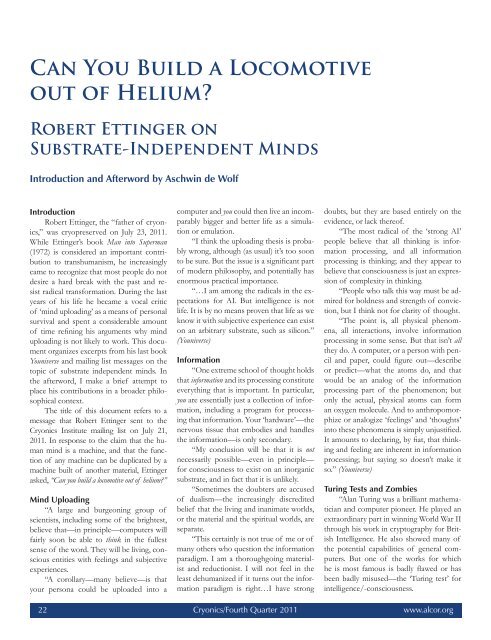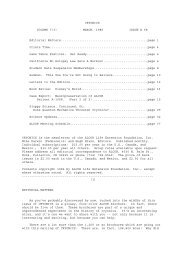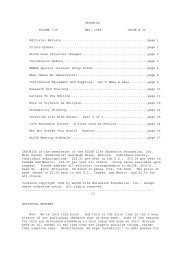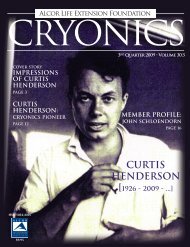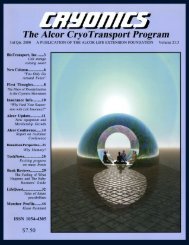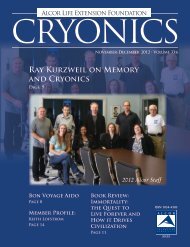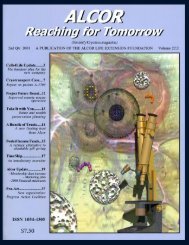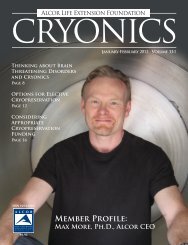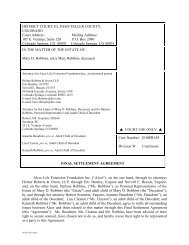Robert Ettinger - Alcor Life Extension Foundation
Robert Ettinger - Alcor Life Extension Foundation
Robert Ettinger - Alcor Life Extension Foundation
You also want an ePaper? Increase the reach of your titles
YUMPU automatically turns print PDFs into web optimized ePapers that Google loves.
Can You Build a Locomotive<br />
out of Helium?<br />
<strong>Robert</strong> <strong>Ettinger</strong> on<br />
Substrate-Independent Minds<br />
Introduction and Afterword by Aschwin de Wolf<br />
Introduction<br />
<strong>Robert</strong> <strong>Ettinger</strong>, the “father of cryonics,”<br />
was cryopreserved on July 23, 2011.<br />
While <strong>Ettinger</strong>’s book Man into Superman<br />
(1972) is considered an important contribution<br />
to transhumanism, he increasingly<br />
came to recognize that most people do not<br />
desire a hard break with the past and resist<br />
radical transformation. During the last<br />
years of his life he became a vocal critic<br />
of ‘mind uploading’ as a means of personal<br />
survival and spent a considerable amount<br />
of time refining his arguments why mind<br />
uploading is not likely to work. This document<br />
organizes excerpts from his last book<br />
Youniverse and mailing list messages on the<br />
topic of substrate independent minds. In<br />
the afterword, I make a brief attempt to<br />
place his contributions in a broader philosophical<br />
context.<br />
The title of this document refers to a<br />
message that <strong>Robert</strong> <strong>Ettinger</strong> sent to the<br />
Cryonics Institute mailing list on July 21,<br />
2011. In response to the claim that the human<br />
mind is a machine, and that the function<br />
of any machine can be duplicated by a<br />
machine built of another material, <strong>Ettinger</strong><br />
asked, “Can you build a locomotive out of helium?”<br />
Mind Uploading<br />
“A large and burgeoning group of<br />
scientists, including some of the brightest,<br />
believe that—in principle—computers will<br />
fairly soon be able to think in the fullest<br />
sense of the word. They will be living, conscious<br />
entities with feelings and subjective<br />
experiences.<br />
“A corollary—many believe—is that<br />
your persona could be uploaded into a<br />
computer and you could then live an incomparably<br />
bigger and better life as a simulation<br />
or emulation.<br />
“I think the uploading thesis is probably<br />
wrong, although (as usual) it’s too soon<br />
to be sure. But the issue is a significant part<br />
of modern philosophy, and potentially has<br />
enormous practical importance.<br />
“…I am among the radicals in the expectations<br />
for AI. But intelligence is not<br />
life. It is by no means proven that life as we<br />
know it with subjective experience can exist<br />
on an arbitrary substrate, such as silicon.”<br />
(Youniverse)<br />
Information<br />
“One extreme school of thought holds<br />
that information and its processing constitute<br />
everything that is important. In particular,<br />
you are essentially just a collection of information,<br />
including a program for processing<br />
that information. Your ‘hardware’—the<br />
nervous tissue that embodies and handles<br />
the information—is only secondary.<br />
“My conclusion will be that it is not<br />
necessarily possible—even in principle—<br />
for consciousness to exist on an inorganic<br />
substrate, and in fact that it is unlikely.<br />
“Sometimes the doubters are accused<br />
of dualism—the increasingly discredited<br />
belief that the living and inanimate worlds,<br />
or the material and the spiritual worlds, are<br />
separate.<br />
“This certainly is not true of me or of<br />
many others who question the information<br />
paradigm. I am a thoroughgoing materialist<br />
and reductionist. I will not feel in the<br />
least dehumanized if it turns out the information<br />
paradigm is right…I have strong<br />
doubts, but they are based entirely on the<br />
evidence, or lack thereof.<br />
“The most radical of the ‘strong AI’<br />
people believe that all thinking is information<br />
processing, and all information<br />
processing is thinking; and they appear to<br />
believe that consciousness is just an expression<br />
of complexity in thinking.<br />
“People who talk this way must be admired<br />
for boldness and strength of conviction,<br />
but I think not for clarity of thought.<br />
“The point is, all physical phenomena,<br />
all interactions, involve information<br />
processing in some sense. But that isn’t all<br />
they do. A computer, or a person with pencil<br />
and paper, could figure out—describe<br />
or predict—what the atoms do, and that<br />
would be an analog of the information<br />
processing part of the phenomenon; but<br />
only the actual, physical atoms can form<br />
an oxygen molecule. And to anthropomorphize<br />
or analogize ‘feelings’ and ‘thoughts’<br />
into these phenomena is simply unjustified.<br />
It amounts to declaring, by fiat, that thinking<br />
and feeling are inherent in information<br />
processing; but saying so doesn’t make it<br />
so.” (Youniverse)<br />
Turing Tests and Zombies<br />
“Alan Turing was a brilliant mathematician<br />
and computer pioneer. He played an<br />
extraordinary part in winning World War II<br />
through his work in cryptography for British<br />
Intelligence. He also showed many of<br />
the potential capabilities of general computers.<br />
But one of the works for which<br />
he is most famous is badly flawed or has<br />
been badly misused—the ‘Turing test’ for<br />
intelligence/-consciousness.<br />
22 Cryonics/Fourth Quarter 2011 www.alcor.org


